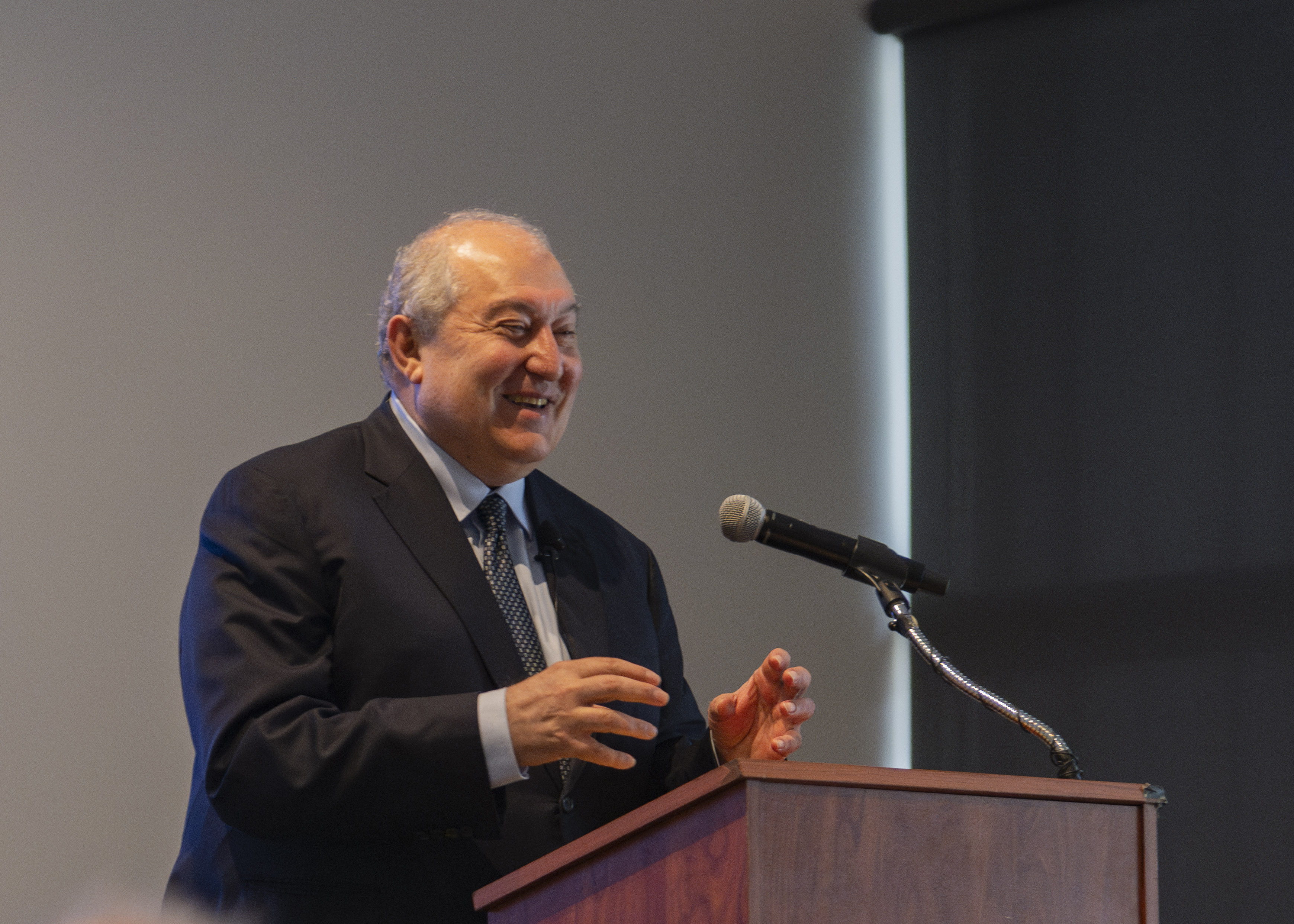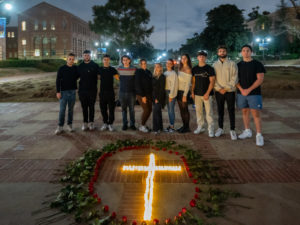The former President of Armenia urged audiences not to overlook small nations, especially those leveraging their strategic leadership and innovation May 28.
Armen Sarkissian, a physicist who served as Armenia’s president from 2018 to 2022, was the guest speaker for the UCLA Burkle Center for International Relations’ annual Bernard Brodie Distinguished Lecture on the Conditions of Peace. Held in the Morrison Room of the UCLA University Club, the lecture drew attendees from both inside and outside of the UCLA community.
The lecture series was created in 1980 to provide a forum for scholars to exchange views on politics, strategy and warfare, according to the Burkle Center website. The discussion series centers on how to maintain peace and security around the world.
Sarkissian was introduced by Chancellor Julio Frenk and Eric Esrailian, Sarkissian’s friend and a health sciences clinical professor of medicine at UCLA. During his introduction, Frenk said it is crucial for UCLA, as a leading university, to host forums where people can present fresh perspectives and innovative scholarship aimed to bridge cultural divides and address the world’s most pressing challenges.
Sarkissian released a book last year titled “The Small States Club: How Small Smart States Can Save the World,” which he said he began working on after former United States Secretary of State Henry Kissinger encouraged him to write his book on how certain small nations become economically and internationally successful.
Sarkissian said he believes it is important for the small states, including Armenia, to leverage local talent before their people are drawn to opportunities abroad. He added that smaller states should prioritize building strong international relationships to advance their international standing.
“Armenians in this whole state have to be smart enough to have good relations with everybody,” Sarkissian said. “Small, smart states are successful because they have the strong instinct of survival. … You’re always surrounded by enemies and so you have to learn how to survive.”

During Sarkissian’s conversation with the moderator of the event and director of the Burkle Center, he said he disagreed with the notion that small states are inherently vulnerable. He added that smaller nations such as Singapore and Botswana have thrived economically while larger states like Germany have faced political and economic difficulties in recent decades.
Sarkissian said his background as a physicist influenced him to adopt the theory of “quantum politics,” which describes how human behavior is reflective of statistical physics and the behavior of particles. He added that understanding human behavior through a quantum framework reinforces the idea that society is evolving to become more individualistic.
Sarkissian also said California, being the world’s fourth largest economy by gross domestic product, should approach its wealth with pragmatism by increasing residents’ quality of life without implementing excessive taxation.
Sarkissian said he opposed Armenia’s 2015 constitutional referendum, which changed the nation to a parliamentary republic, because the constitution was written primarily by German consultants. He added that he believed the inherent differences between Armenia and Germany made the parliamentary system ill-suited for Armenia.
“You cannot have a mold for everybody,” he said. “Each of us has our history, our culture, our identity. … Armenians are not Germans. The same constitution will work very well as a democratic constitution in Germany, but it will not work in Armenia that has lived in the Soviet Union for 17 years.”
Sarkissian also said small nations now have a greater opportunity to become future world leaders in an era of technological innovation, adding that he would like to see the creation of an international forum similar to the Group of 20 – which is an annual gathering of the world’s largest economies – but for rising small states.
“The world has changed,” Sarkissian said. “Small, smart states are there. They are going to make a lot of change for this world.”
Raustiala said given the current tensions in the geopolitical climate, a lecture series on peace and security is a particularly important conversation to be having today.
“The lecture was inaugurated during the Cold War, a time when there was significant conflict in the world,” he said. “Things seemed very dark. Over the years, we lived in some more peaceful times. Today, I think it’s fair to say we live in some darkening times.”
Shahen Akopyan, a second-year biochemistry student, said he “dropped everything” to attend the lecture because his Armenian parents frequently discuss Sarkissian and his political decisions at home.
He added that he was also intrigued by the rare opportunity to hear from a prominent world leader in person, especially one with a background in science.
“One of the crucial roles of the universities is to convene,” Frenk said while introducing the event. “It’s through that function that we bring people together with multiple perspectives to address issues of great importance. This is what makes good universities intellectually vibrant places.”



Comments are closed.